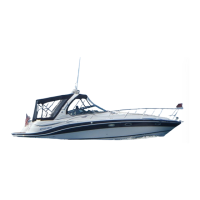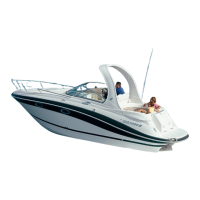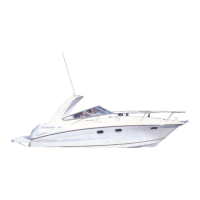Do you have a question about the Four winns Vista (1994-2000 models) and is the answer not in the manual?
Contact information for Four Winns Customer Service Department.
Diagram showing the locations of various labels on Vista models.
Details the Four Winns Owner Protection Plan and engine warranty.
Outlines the specific warranty coverage for the boat's hull structure.
Explains the importance and process of registering the boat for warranty.
Details how to transfer the warranty coverage to a new owner.
Instructions for registering a pre-owned Four Winns boat.
Advises on acquiring proper insurance protection for the boat.
Information on recording serial numbers for major components.
Describes the dealer's pre-delivery inspection and service process.
Information on obtaining and ordering replacement parts.
General safety and service precautions for engine and drive systems.
Discusses engine exhaust hazards, particularly carbon monoxide.
Information about the optional Carbon Monoxide (CO) monitor.
Details regarding engine and drive systems.
Refers to the engine owner's manual for operation and maintenance.
Description of the stern drive propulsion system.
Instructions on using the engine flush out option for cooling systems.
Explains propeller terminology and performance aspects.
Defines propeller diameter and its effect on engine RPM.
Defines propeller pitch and its effect on engine RPM.
Explains the concept of propeller slip and its measurement.
Discusses optimal running angles and the use of trim systems.
Explains the function and operation of the power trim system.
Information on using the power tilt for trailering, launching, and beaching.
Details on the optional electric/hydraulic trim tabs for hull control.
How to use trim tabs to compensate for boat listing.
Using trim tabs to achieve faster planing and control running angle.
Guidance on maintaining the trim tab system and fluid levels.
Overview of the helm station instruments for engine monitoring.
Explains the tachometer and its function in monitoring engine RPM.
Details on the water pressure sensitive speedometer and its limitations.
Information on the engine temperature gauge and its importance.
Explains the oil pressure gauge and potential issues.
Information on the voltmeter for monitoring battery condition.
How the fuel gauge indicates the amount of fuel in the tank.
Visual indication of the outdrive's trim angle.
Information on the standard depth gauge.
Details on the optional gas vapor detector for safety.
Records elapsed engine operating time for maintenance scheduling.
Explains the functions of the ignition switch positions.
Instructions for using the emergency stop switch and lanyard.
Information on audible engine alarm systems for oil pressure and temperature.
Guidance on maintaining electrical instruments and ignition circuitry.
Overview of control systems, throttle, and shift mechanisms.
Details on operating single and twin engine controls.
How to increase engine speed during cold starts with single lever controls.
Specifics on starting EFI engines and initial warm-up.
Explains the neutral safety switch function to prevent starting in gear.
Procedures for inspecting, servicing, and lubricating control systems.
Overview of Four Winns steering systems and features.
Description of the rotary steering system components.
How to operate the tilt steering mechanism.
Details on the standard power steering system and its operation.
Explains propeller torque effects and how to correct them.
Periodic inspection and maintenance of steering cables and assemblies.
General information on electrical systems, AC/DC power, and circuit protection.
Details of the standard single battery system on 238 and 258 models.
Information on the optional/standard dual battery system.
Instructions for installing dual batteries in dual engine systems.
Operation of the battery selector switch for 238/258 and 278 models.
Information on the battery charger and its location.
Details on the dual engine, dual battery system for the 278 model.
Description of various 12-volt DC equipment and their controls.
Overview of helm equipment protection by fuses/breakers.
Guidance on adding aftermarket 12-volt accessories.
Information on interior cabin equipment protection.
Explanation of the AC electrical system and its components.
Procedures for connecting and operating the boat on dockside power.
Steps for safely connecting and disconnecting shore power cables.
Information on 120-volt AC powered equipment and their protection.
Explains the reverse polarity indicator and its safety implications.
Information on GFCI protection for electrical outlets.
Details on the optional generator for providing AC power.
Maintenance procedures for batteries and electrical wiring.
Proper care and maintenance of boat batteries.
Inspecting wiring for damage and corrosion.
Information on electrically induced underwater corrosion.
Explains what stray current corrosion is and its causes.
Explains galvanic corrosion and its causes.
Methods for preventing corrosion using anodes.
Comprehensive guide to gasoline fuel systems.
Procedures for inspecting and testing the fuel system.
Proper use and inspection of fuel fill deck plates and o-rings.
Function of fuel vents and precautions during fueling.
Information on anti-syphon valves and their importance.
How the fuel gauge indicates the amount of fuel in the tank.
Description of the fuel sender mechanism and its readings.
Importance of replacing fuel filters for engine health.
Details on the optional gas vapor detector for safety.
Important safety and maintenance procedures for fuel systems.
Precautions and considerations when using gasoline containing alcohol.
Lists potential problems caused by alcohol in gasoline.
Step-by-step guide for safe and proper fueling procedures.
Overview of the fresh water supply system components.
Capacities and locations of water supply tanks by model.
Details on the self-priming water pump and system operation.
Steps for priming the pressurized water system after filling the tank.
How to operate the pressurized water system for consistent water delivery.
Information on the six-gallon water heaters and their power requirements.
Instructions for operating the shower and maintaining the shower sump pump.
Optional grey water system details, including pump-out locations.
Locations for grey water deck fittings by model.
How to connect to city or shoreside water supply for constant water.
Information on the transom washdown option.
Information on heads and their systems, including portable and porcelain types.
Details of the standard portable head unit.
Operation of the manually-operated porcelain head with holding tank.
Option for overboard discharge of waste, including macerator pump use.
How to use dockside waste pumping stations.
General maintenance for water and waste systems, including battery charging.
Cleaning water tank vent fittings and faucet screens.
Procedures for winterizing the fresh water, grey water, and waste systems.
Steps for winterizing the waste holding tank and toilet.
Information on engine compartment ventilation systems.
Description of the gravity ventilation system components.
Operation of the electric bilge blower for ventilation.
Procedures for maintaining engine ventilation ducts and blowers.
How to ventilate cabin spaces and potential CO risks.
Details on transom drains, bilge pumps, sumps, and cockpit drainage.
Location and use of the transom drain plug.
Function and control of bilge pumps for water removal.
Information on the sump box and its operation.
Drainage of sealed bulkhead areas.
How self-bailing cockpits drain water overboard.
Detailed information on carbon monoxide causes, effects, and symptoms.
Defines carbon monoxide and carboxyhemoglobin.
Properties of carbon monoxide, including its lack of odor and color.
Identifies common sources of carbon monoxide production.
Explains how carbon monoxide affects the human body.
Describes the health effects of carbon monoxide exposure.
Lists symptoms that may indicate carbon monoxide poisoning.
Steps for treating carbon monoxide exposure and investigating the source.
Inspecting exhaust systems and ventilation for CO leaks.
Operating procedures to minimize carbon monoxide production.
Awareness of CO accumulation risks in confined areas.
Explains backdrafting and its effect on CO concentration in the boat.
Ventilation requirements for fuel-burning cabin appliances.
Potential for CO to enter air-conditioned spaces.
Importance of ventilating accommodation spaces and CO risks.
How altitude and sea conditions affect engine performance and CO.
Information on portable generators and their CO risks.
Engine maintenance factors affecting CO production.
External factors affecting engine performance and CO production.
Information on Carbon Monoxide (CO) detectors and their types.
Details on galley appliances like stoves, microwave, and refrigerator.
Information on the alcohol stove and its safe operation.
Details on the optional alcohol/electric stove.
Information on the optional microwave oven.
Description of the standard ice box.
Information on dual voltage refrigerators and their operation.
Details on the standard AM/FM cassette stereo system.
Information on the available air conditioning unit and its operation.
General overview of the air conditioning unit and its power requirements.
Operating the air conditioning unit and its cooling medium.
Cleaning the sea water strainer and air filter screens.
Information on hand rails, deck hardware, cleats, and their maintenance.
Description of the transom door and its security.
Details on the companionway door, lid, and securing mechanisms.
Information on windshields and cabin windows, including plexiglass care.
Material and care for windshields and cabin windows.
Proper cleaning and care instructions for plexiglass components.
Information on foredeck hatches and their ventilation use.
Description of the integrated swim platform and boarding ladder.
Storage compartments provided throughout the cockpit area.
Information on anchor storage, bow roller, and windlass options.
Recommendations for storing anchors and related equipment.
Description of the standard bow roller assembly.
Details on the optional windlass for anchor retrieval.
Information on compass, depth sounder, and VHF radio.
Importance and calibration of the boat compass.
Information on standard depth sounders and their use.
Details on the optional VHF radio for communication.
Description of the optional VHF and GPS network system.
Information on the optional radar arch installation.
Details on the optional spotlight for nighttime cruising.
Information on cabin seating arrangements and storage.
Details on cabin table mounting, storage, and use.
Description of the V-berth fill-in cushion and surrounding storage.
Information on the standard dinette and its table.
Details on mid cabin berths and storage compartments.
Information on companion helm seats and their adjustment.
Details on the companion helm seat, including adjustment mechanisms.
Information on the stern seat and optional fill-in cushions.
Procedures for cleaning and maintaining interior fabric upholstery.
Guidance on cleaning interior fabric, including recommended cleaners.
Instructions for cleaning and maintaining exterior vinyl upholstery.
How to obtain replacement upholstery cushions and jackets.
Information on cleaning and maintaining interior and exterior carpets.
Details on carpet material and recommended maintenance.
General tips for keeping carpet well maintained.
Procedures for removing common stains from carpet.
General information and care for weather covers.
Details on the standard bimini top and camper canvas.
Information on the optional cockpit cover for short-term storage.
Precautions for trailering to prevent damage to weather covers.
Recommendations for protecting the boat during winter storage.
Factors affecting the longevity of acrylic covers and their maintenance.
Carbon monoxide hazards when underway and with canvas installed.
Information on Four Winns hull design principles and features.
Details on the quality and techniques of fiberglass construction.
Precautions for installing equipment through fiberglass components.
Procedures for cleaning and maintaining fiberglass gel coats.
General cleaning and waxing guidelines for fiberglass.
Explains common weathering effects like chalking and fading.
Procedures for removing various types of stains from the boat exterior.
Step-by-step guide for repairing fiberglass damage.
Method for repairing minor scratches in the gel coat.
Procedures for repairing stress cracks, gouges, and crazing.
Explanation of osmotic blistering and its cosmetic nature.
Recommendations for applying and maintaining anti-fouling paint.
Importance of proper hull support when out of the water.
Procedures for cleaning, dressing, and maintaining teakwood.
Cleaning instructions for laminate surfaces like formica.
Care and cleaning of ash trim used in boat interiors.
Care and cleaning of birch trim used in boat interiors.
Cleaning and maintenance of Starboard material.
Cleaning and care instructions for Fountainhead material.
Detailed procedures for preparing the boat for winter lay-up.
Steps to take before lifting the boat for winter storage.
Procedures to follow after the boat has been lifted for winter.
Instructions for flushing the engine cooling system.
General information about Four Winns trailers and matching boats.
Trailer and tire registration requirements and varying state laws.
Understanding trailer load capacity (GVWR) and avoiding overloading.
Information on trailer hitches, ball size, and vehicle compatibility.
Details on bunk supports, tongue, and swivel jack.
Information on bunk support materials and function.
Details on the trailer tongue and its removal for storage.
Proper use and setup of the trailer swivel jack.
Explanation of how surge brakes operate and their components.
Proper operation and maintenance of the trailer winch.
Information on trailer wheel rims, tires, and proper inflation.
Information on the optional spare tire carrier.
Maintenance and replacement of trailer lights.
Importance of securing the boat to the trailer with tie-downs.
Procedures for hitching, backing, and trailering the boat.
Detailed steps for properly hitching the trailer to the towing vehicle.
Step-by-step instructions for safely backing up the trailer.
Essential checks and tactics for safe trailering.
Pre-trailering inspection checklist for tires, coupler, lights, and brakes.
Recommended tactics for safe trailering, including mirror use and speed.
Maintenance procedures for trailer exterior finish, bunks, and swivel jack.
Maintaining the trailer's paint finish and preventing rust.
Replacing cracked, warped, or rotted bunk boards.
Cleaning and lubricating the swivel jack.
Maintenance of the brake actuator and coupler assembly.
Inspecting and servicing trailer wheel bearings and seals.
Procedures for inspecting and repairing axle components.
Steps for removing the wheel hub to inspect bearings and seals.
Inspecting grease seals and bearings for damage or wear.
Procedures for reinstalling the wheel hub and tightening lug nuts.
General guidance on boat operation and safety checks.
Importance of understanding boat systems for enjoyment and maintenance.
Required safety equipment and Federal requirements.
Responsibilities for passenger safety and behavior aboard the boat.
Essential boating rules and recommended education courses.
Safety precautions to take during lightning storms.
Emphasizes the dangers and illegality of operating a boat under the influence.
Essential pre-cruise checks before leaving the dock.
Checklist of items to inspect before starting the boat's engine.
Checks to perform after the engine has been started.
Procedures for starting engines and shifting gears.
Pre-start checks for the engine compartment and systems.
Specific procedures for starting a cold engine.
Procedures for starting a warm engine.
How to properly shift the boat's transmission between gears.
Safety precautions and procedures for grounding and towing boats.
Resources for boating education courses and literature.
Information on available boating education courses.
Recommended boating manuals and literature for further learning.
Where to obtain U.S. nautical charts and recreational maps.
Definitions of common boating terms and nautical vocabulary.
| Category | Boat |
|---|---|
| Manufacturer | Four Winns |
| Model | Vista |
| Years | 1994-2000 |
| Length Overall | Varies by model (e.g., 258 Vista: 25'8") |
| Beam | Varies by model (e.g., 258 Vista: 8'6") |
| Dry Weight | Varies by model (e.g., 258 Vista: 5, 200 lbs) |
| Maximum Horsepower | Varies by specific model |
| Passenger Capacity | Varies by specific model |











